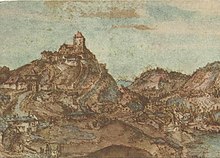Conrad VII of Soest
Conrad VII von Soest (* around 1370 in Soest ; † May 18, 1437 in Regensburg ) was the 40th Bishop of Regensburg from 1428 to 1437.

Conrad VII was initially in the Archdiocese of Cologne . He studied in Heidelberg , where he graduated as a doctor of theology and was rector of the school. In contrast to other literature, Staber identifies Konrad VII as the place of origin of Suss near Amberg and describes him as a former auxiliary bishop of Amberg.
In 1409 Conrad VII belonged to King Ruprecht's embassy in Pisa . As a respected theologian, he is found later in the suite of Pope Gregory XII. , he worked as his legate in Germany and was at the Council of Constance and the Council of Basel and participated as one of the six members of the Germanic Council nation in the election of Pope Martin V. As Bishop of Regensburg, he held regular diocesan synods a.
The Hussites continued to invade the diocese. A formed German army was put to flight by the Hussites. The battle of Hiltersried and parallel negotiations in which the bishop was involved did not ease the situation either.
He was a contemporary of Andreas von Regensburg , who also stayed in Regensburg until his death.
literature
- Remigius Bäumer: Conrad VII of Soest. In: New German Biography (NDB). Volume 12, Duncker & Humblot, Berlin 1980, ISBN 3-428-00193-1 , p. 523 f. ( Digitized version ).
- Michael Buchberger (Ed.): 1200 years of the diocese of Regensburg . Regensburg 1939, p. 43.
- Josef Staber: Church history of the diocese of Regensburg . Regensburg 1966, pp. 81-83.
| predecessor | Office | successor |
|---|---|---|
| Johann II von Streitberg |
Bishop of Regensburg 1428–1437 |
Friedrich II of Parsberg |
| personal data | |
|---|---|
| SURNAME | Conrad VII of Soest |
| BRIEF DESCRIPTION | Bishop of Regensburg |
| DATE OF BIRTH | around 1370 |
| PLACE OF BIRTH | Soest |
| DATE OF DEATH | May 18, 1437 |
| Place of death | regensburg |
